Action Toolkit
A small but vocal group is driving the current flood of book bans in school and public libraries across the country. It's important to counter those voices by uniting in support of the freedom to read in your local community. How can you and your community unite against book bans? We've put together this action toolkit to help you get started.
Are you part of an organization? You can find additional resources to amplify and support the Unite Against Book Bans campaign in the UABB Toolkit PDF.
How to Talk About Book Bans
Below are a set of talking points which should be customized to reflect your own voice. These can be tailored to talk about a specific book that is being challenged or used more generally to oppose book bans. The points can be used for writing a letter to your local school or library board, your state legislators and governor, or as the basis of your public comments given to any elected bodies during their meetings. They can also be used to help you draft a letter to the editor of your local newspaper or in speaking with members of the media. All of these actions are important ways you can help have an impact on the issue of book bans.
Reading is a foundational skill, critical to future learning and to exercising our democratic freedoms.
We can trust individuals to make their own decisions about what they read and believe.
Parents have the right to guide their children's reading, but parents should not be making decisions for other parents' children. Specifically, a small group of parents should not dictate what books other people's children are allowed to read.
Books are tools for understanding complex issues. Limiting young people's access to books does not protect them from life's complex and challenging issues.
Please reject any efforts to ban books and allow individuals and parents to make the decision about what they can read and believe.
Visit UniteAgainstBookBans.org to learn more and to join our efforts.
Answers to Common Questions about Book Bans
Q: How do I handle difficult conversations with individuals seeking to ban books, especially parents concerned about what their kids are reading?
A: We must trust individuals to make their own decisions about what they read and believe. We also believe that parents have the right to guide their children's reading and education. At the same time, individuals should not be making decisions for other readers or for other parents' children. Specifically, a small group of parents should not dictate what books other people's children are allowed to read.
Q: What if someone says that children are too young to begin reading a book that addresses sexually explicit topics?
A: We recognize that there will be disagreements over certain content. However, individuals should not be making decisions for other readers or for other parents about what is appropriate.
Services, materials, and facilities that fulfill the needs and interests of library users at different stages in their personal development are a necessary part of providing library services and should be determined on an individual basis.
Reading materials available in the library are available to students for personal selection; they are not required books. Banning these materials will remove access for all members of the community.
Q: What if someone argues that they don't want their children being taught political views that they find objectionable, such as critical race theory?
A: School educators and librarians are professionals who are trained to not impose their own thoughts and opinions on which ideas are right, but to make knowledge and ideas available so that people have the freedom to choose what to read. Further, librarians and educators respect the rights of parents to decide which book their children are exposed to. They work closely with parents to help them decide the best books for their children.
Libraries provide access to books that offer teachable moments for readers of all ages and expand our understanding of people with different backgrounds, ideas, and beliefs.
Attending Library and School Board Meetings
Most book ban battles are being fought on the local level at library board, school board, and city council meetings. That makes attending these meetings one of the most critical actions you can take to fend off book bans. Make sure local officials know you support the library and access to books of all kinds by attending, listening, and speaking out against censorship.
Government and board websites often post calendars and agendas for upcoming meetings, and some also livestream them. Even if book bans or collection policies aren't on the agenda, many boards and councils allow comments on issues of concern from any community member.
Our partners at PFLAG have created a helpful guide for speaking at library and school board meetings. The below has been adapted from their Plan to Testify at Local Board Meetings guide.
Things You Need to Know
Before you head to a board or city council meeting, you'll need to know the following:
-
- When and where will the meeting take place?
- The policy around public comments:
- Where do public comments fall in the agenda?
- How long do you have to speak during public comments?
- Do you have to register ahead of time to make a public comment?
- Are there any rules for the contents of comments?
- Is there a dress code or a code of conduct attendees are expected to follow?
Important Things to Consider
Safety in numbers: gather supporters and encourage them to attend the meeting.
Prepare your remarks ahead of time so you know what you're going to say. Make use of the talking points in the UABB Action Toolkit.
Be Informed
Understanding why a book is being challenged is critical to speaking in its defense. As you make a plan to attend and speak at the meeting:
-
- Read the book that is being challenged.
- Understand what specifically about the book is making it a target for restriction or removal.
- Research other instances where the book has been challenged in other communities and the outcomes of those challenges.
At the Meeting
Introduce yourself: Mention that you are a constituent and any ties to your community.
Introduce and discuss the issue: Raise the topic you are there to discuss (book ban, library policy, library program, etc.).
Make it personal: Why does it matter to you? Does this issue affect your child? Yourself? Your community? Make sure you relate what you are asking for to a personal experience and a local need. Use your emotion to your benefit.
Make the ask: Ask for the board to reject any proposed censorship and uphold the First Amendment.
Thank them: Thank the board or officials for listening to and considering your comments.
Be Ready for the Next Meeting
Keep track of and make a plan to attend future meetings, and make sure your local network knows about them. Consistently showing up is key!
Contact Decision Makers
Public input is very important for school and library board members, trustees, and state legislators. In almost all localities, these are elected positions and many local elected officials serve in either 2- or 4-year terms. These elected officials, therefore, take the views of residents and voters seriously, and seek to represent the voices of their community.
Find Your Officials
Local Officials
To identify who sits on your local school or library board, search online for your municipality’s or county’s name and “school board” or “library board.” From there, most websites will include the email address and/or other contact information for each of the board members, as well as a general email account for the board. You may alternatively seek to call your local library or school to ask for the contact information of these officials. We recommend that you include all of the members of the board in the email or letter that you submit.
State and Local Representatives
Many state legislatures also provide an online search tool to identify who your state senator(s) and state representative(s)/delegate(s) are based on your address. Try searching congress.gov to find your state officials.
Use the talking points provided above to customize your message to these elected officials. Your letter or comments will be strongest if you are succinct, while also demonstrating your concern over book banning efforts and your connection to this issue (i.e. as a parent, as a student, as an educator, as a local business owner, as an engaged community member, as a librarian, as a reader, etc.).
You may also choose to attend your next school board or library board meeting to speak against book bans. Most websites of these local boards will include the agendas of upcoming meetings where public comment is allowed. Note that public comments during these meetings are usually limited to 2-3 minutes per speaker, so keep your remarks brief and to the point. Please remember to be respectful and refrain from making ad hominem or personal attacks against anyone who disagrees with you.
Candidate Questionnaire
If you're involved in a local political organization, trade union, advocacy group, or another influential community organization, a candidate questionnaire is a great tool to help assess local candidates running for office and their position on book bans. Just be sure to consult federal and state election laws that may govern or limit your organization's political activity first!
We recommend sending the questionnaire as early as possible in the election cycle to all declared candidates. Set a firm deadline for their campaign to respond (ideally a minimum of six weeks prior to Election Day).
Petitioning Decision Makers
If a book challenge or attempted ban occurs in your community, one way to demonstrate widespread opposition to removal of that book is to petition the person or group that is responsible for deciding whether the book will stay on the shelves. This can be a school administrator or board, a library board, a town council, etc.
It's important to note that petitions alone are generally not enough to change the minds of decision makers. When combined with other activities, however, they can be powerful in demonstrating wide support for (or opposition to) a particular issue and growing your base of advocates.
Create, Circulate, and Successfully Deliver a Petition:
Create
- Identify the decision maker(s) and address the petition to that/ those person(s).
- Keep your statement short, factual, and end with a specific request for action, e.g., We urge you to keep [title of book] in the library’s collection.
- If filing a paper petition, include your statement at the top of each page. Clearly state your concern and what you would like decision makers to do.
- Make sure that there is adequate space to sign.
- Include fields of information to show that the signer is a constituent of the petition recipient(s). This can be a zip code, address, town, school district, etc.
- Allow for 10 signature lines per page; this will make it easier to tally the number of collected signatures.
Circulate
Focus on collecting signatures from the constituents of the targeted decision makers. It can be harmful to your cause if the majority of voices are from a different community.
Plan your signature gathering and ask others to assist in collecting signatures.
For paper petitions, set up in high traffic areas, e.g., near grocery stores, public transportation stops, or in front of public buildings. Use signage to identify your cause. Consider hosting multiple events at different times of day.
For online petitions, use email and social media to reach large numbers of supporters.
A large number of signatures is necessary for impact. Set a goal based on the size of the constituency.
Deliver
Consider timing. Deliver the petition before a decision is made. Set an internal deadline of at least 3-5 days prior to the anticipated decision to allow for any logistical delays and for your delivery of the petitions to have the strongest impact.
There are many online tools that can make creating a petition easy, e.g., Change.org. Keep in mind, however, that it is most effective to deliver a petition to the decision makers in person, at a public event, with physical copies of your petition.
Let the local press know that you will be presenting a petition. Have a copy of your statement ready to share with them. Notify the press the day before you plan to deliver the petitions and again on the morning of your delivery.
Bring a group of supporters to join you. Identify your spokesperson and make a statement as you present the petition. Make a copy of the original document before presenting it.
Contact Media
Writing a letter to the editor of your local newspaper is another way to have an impact on the conversation around book bans. Search online for the name of your local newspaper along with “submit a letter to the editor.” Those instructions should provide you with an email address, mailing address, or a web form where you can submit your letter.
Tips for Writing a Letter to the Editor:
Although not a requirement, your letter will have the best chance of being published if you:
respond directly to a related article or column recently published in that outlet;
reference local events or activity, such as efforts to ban a specific book or set of books at a public library or school in the community, or comments made by a public official; and/or...
personalize your letter by including a story that will resonate with other readers. You may discuss the impact an attempted or enacted book ban will have on you, your family, and/or your community.
Refrain from making any personal attacks or any ax-grinding comments. Use the suggested talking points at the top of this toolkit to customize your letter.
Remember that most newspapers will limit the length of letters they choose to publish. Typically, those limits are approximately 200-300 words. Before you submit your letter, be sure to research any word limits or other submission requirements - and stick to them. When you submit your letter, be sure to include:
- Your name
- The town or locality where you reside
- Your email address and telephone number
- Any other required information from the publication
After you've submitted your letter, you may choose to call the newspaper to confirm your submission has been received. If you call, ask to speak to the opinion page editor. If you're able to speak to that individual or if you leave a voicemail, be courteous and respectful.
Share Your Progress!
Once you’ve taken these steps, share your work with others! Be sure to tag #UniteAgainstBookBans on social media or email UniteAgainstBookBans@ala.org to let us know what actions you have taken!
Grassroots Organizing
This can be a difficult issue to work on alone, so consider all of your networks and connections in your community to unite with: family, friends, organizations you're involved, etc. Research shows that opposition to book bans is widespread and you will likely find support within your community to unite against such efforts.
The talking points at the top of this toolkit can be used to have one-on-one or group conversations with organizations you belong to – parent organizations, civic groups, faith communities, book clubs, non-profits, sports leagues, and more. If you represent an organization, contact other organizations that might work in coalition with you.
Encourage fellow supporters to sign up with the Unite Against Book Bans campaign and to take the steps outlined in this toolkit.
Organizing Against Attempted Book Bans
Efforts to censor or ban books are increasing across the nation, so it's important to be prepared in case a book challenge occurs in your community. Timely action can help prevent a ban from taking place. Mobilize your community and prevent a book ban attempt at your public library or school district by following these recommendations:
Be Informed
The first step in responding to a book challenge is understanding the situation. Seek to understand the following:
- Which book(s) are being challenged or banned in your district?
- Why is this challenge or ban occurring?
- Who is challenging or banning these books?
- Which themes or content in the books are being challenged or banned?
- Consider the timing: when was the challenge filed, is the public school or library board currently reviewing this challenge, or has the ban already taken effect?
- Does the library or school have a written reconsideration policy to direct the review of a challenged book?
- If the ban has taken effect, when did that happen? What information about the decision to remove the material has been shared with the public? If a policy for reconsideration exists, was the policy followed?
Gather Support
Once you have a thorough understanding of the book challenge, gather support from your community members. Quickly schedule a short meeting to connect with allies and discuss the book challenge. A virtual gathering may allow for more attendees to participate in a short timeframe.
Begin the meeting by sharing what you know and your sentiments. Encourage others to share their perspectives and understandings, and avoid personal attacks on those pursuing the ban.
The goals of this meeting should be to develop a message for pushing against the particular book ban and to encourage your allies to individually voice their opposition to the ban with the school or library board that has oversight authority.
In your statement, use the UABB campaign principles and tailor your messages to the specific book ban or challenge. Submit your comment in writing to the governing board, and attend any meetings of the board where public comments will be accepted to voice your opposition.
Use our guide on how to contact and petition elected officials and submit your comments as soon as possible.
Raise Awareness
Next, Join with your network of supporters to spread the word about the book challenge.
Share your message on social media. Encourage your larger network to voice their opposition to the ban with the governing board by drafting written comments and showing up at the next public meeting of the board to provide comments.
Submit a letter to your local newspaper. Use our guide on how to write a letter to the editor and customize your letter to discuss the impact of the ban.
Your group may also want to consider performing a peaceful protest if the book ban efforts continue to progress and demonstrate signs of passage. See our section on best practices for staging a protest.
Report the Incident to ALA
As part of their longstanding commitment to defend intellectual freedom in libraries, the American Library Association's Office for Intellectual Freedom maintains a database of attempted challenges and bans. If a book challenge takes place in your district, ALA may be able to provide support and more customized resources to oppose the attempted challenge or ban.
These reports also help ALA and other organizations:
- Stay aware of patterns and trends around efforts to ban reading materials
- Supply library workers and other professionals with crucial tools, resources, programs, and training to uphold the freedom to read
- Compile data and publish the Top 10 Most Challenged Books list and other censorship trend reports for public awareness.
Peaceful Protests
When organized effectively, a peaceful protest can be instrumental in gathering attention and support for your position. As such, a peaceful protest, paired with other action items, can help combat book bans in your community. Below is a set of best practices that you can use to plan a protest to combat book bans.
1) Mobilize and Organize
Reach out to people in the community who support the freedom to read and encourage them to participate in a protest to prevent a particular book ban in your district. Once you have a group of at least 5-10 allies, agree on a leadership structure for the protest details to ensure smooth communication and delivery.
2) Plan Logistics
Choose a public location, date, and time to gather that allow for maximum participation and visibility. Consider a time just prior to when the decision-making body is planning to meet and invite as many opponents of the ban as possible to attend.
3) Develop the Protest Schedule
Collaborate to develop a schedule with key action items, such as:
- A march from one point to another in the designated location
- Having an emcee lead protest chants for the attendees
- Having parents, students, and other community members provide personalized testimonies on the book challenge and their perspectives on book bans
Determine whether you'll need a microphone and speakers for attendees to hear you. Secure any necessary A/V equipment and if possible, test it in advance of the protest at your desired location.
4) Obtain Necessary Permits
Contact your local officials and obtain the appropriate permit required to protest in your designated location. The permit may outline rules, limitations, and expectations for protesting, including noise levels and crowd sizes. Every community has its own set of laws and requirements for protests; some may not require a permit.
5) Notify Officials and the Media
Notify your school, library, or community center of the protest and the details of the event to ensure safe practices. Also, invite local media to attend your protest to generate local coverage.
6) Publicize
Publicizing details of the protest on social media and around the community can help gather larger support. Include information on the issue, the purpose of the protest, and details of the date, time, and location of the protest.
7) Gather Materials
Make sure to gather and distribute your protest materials in advance to ensure smooth delivery. Some examples of protest materials include t-shirts and signs that clearly convey the purpose of the protest.
8) Remain Peaceful and Obey All Laws
A protest can be a powerful tool in exercising free speech and in advocating for issues like the freedom to read, but it’s important to remain peaceful and obey the laws along with any rules outlined by the protest permit. Avoid disrespectful language or actions, as well as directly confronting those who disagree with your protest.
9) Wrap Up
After the event, develop a write-up summarizing the event and include photos/videos from the protest. For maximum visibility, we recommend sharing these with decision-makers, media, and on social media with your allies. Have others in your group do the same.
Other Tools and Actions
Free Downloads
Show the world you unite against book bans! With our free yard and rally sign templates and bookmarks, as well as official merchandise for purchase, you can help spread awareness of the UABB campaign wherever you are.
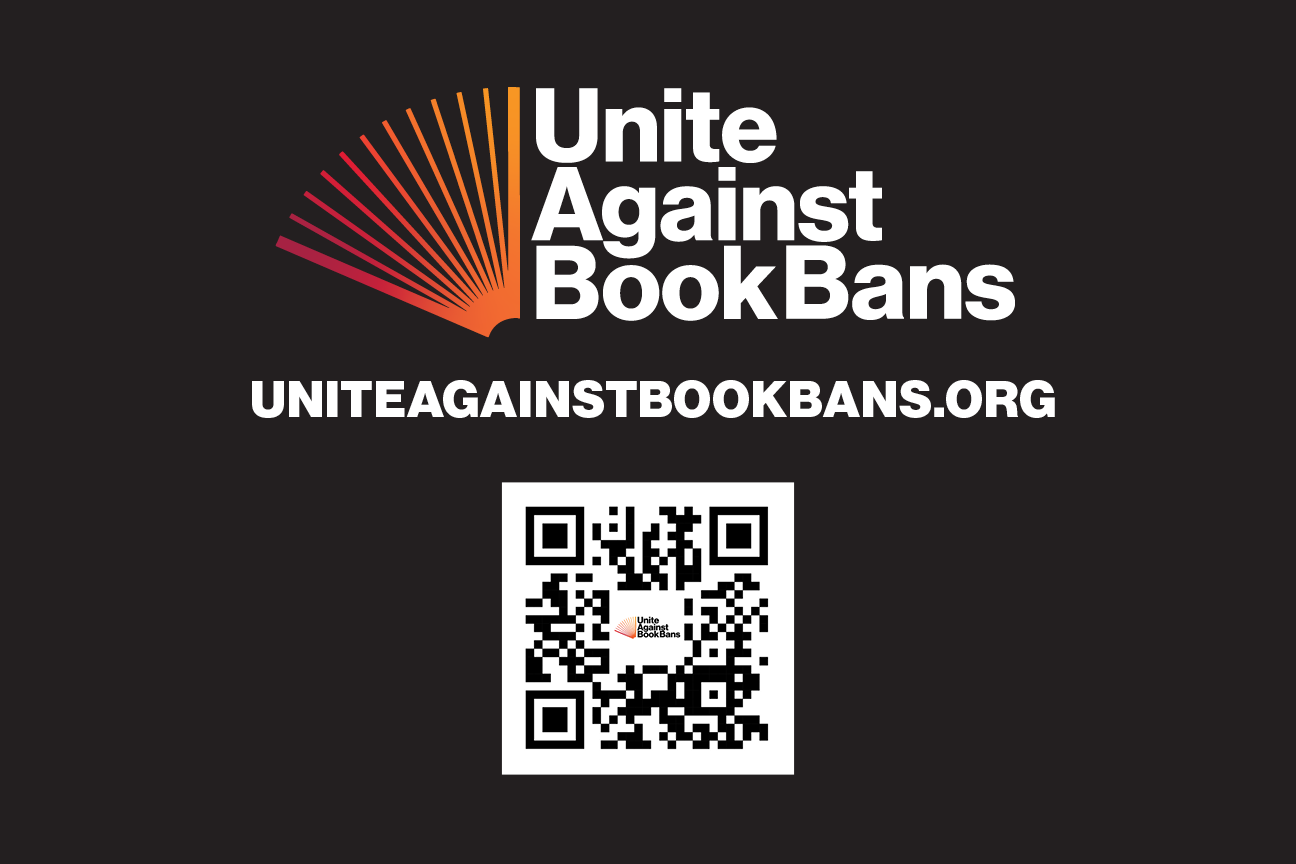
Rally Sign (18" x 12")
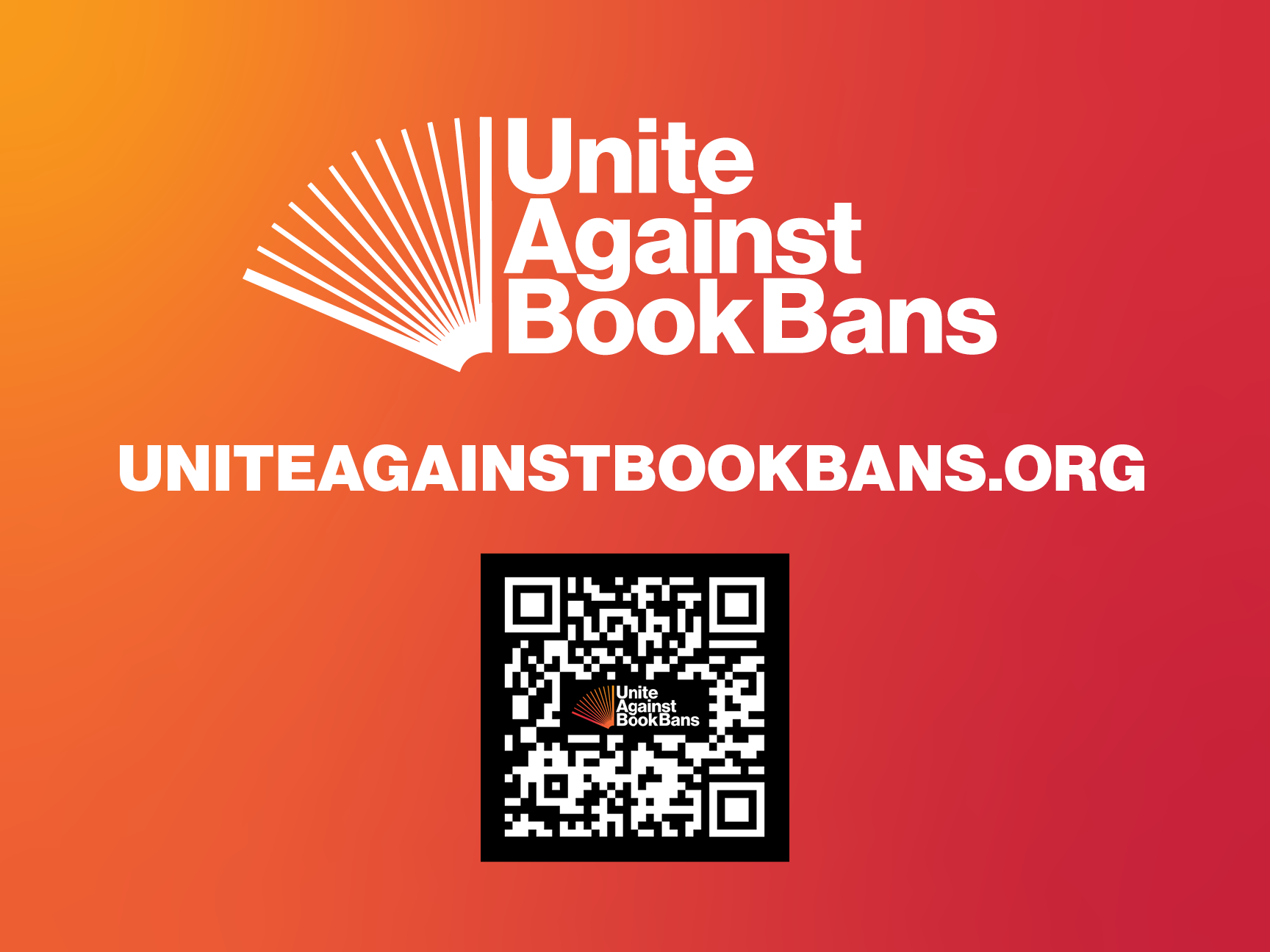
Yard Sign: 24" x 18"


Bookmark
Is your library experiencing attempts to ban books or other resources? Report censorship to ALA's Office for Intellectual Freedom and help defend the freedom to read at your library. Challenge reports are confidential and help us stay aware of current attempts to censor library materials.
For more tools and tips to help you or your organization fight book bans in your community, download the UABB PDF Toolkit.

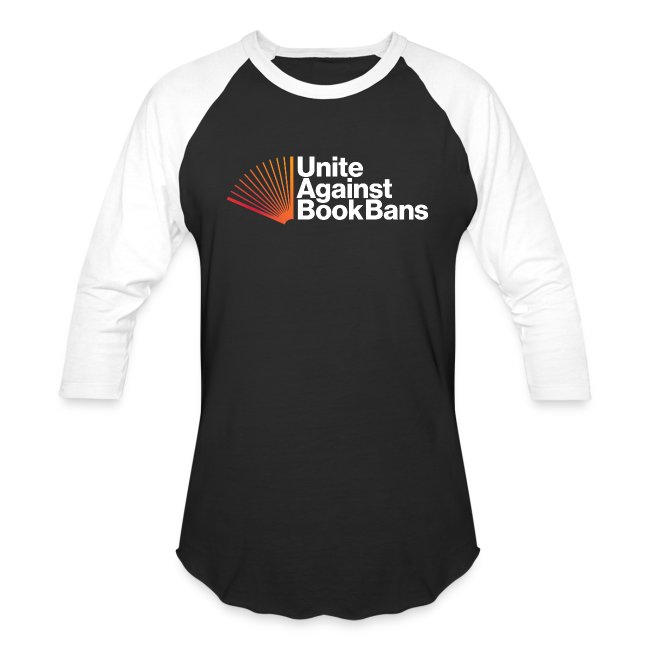
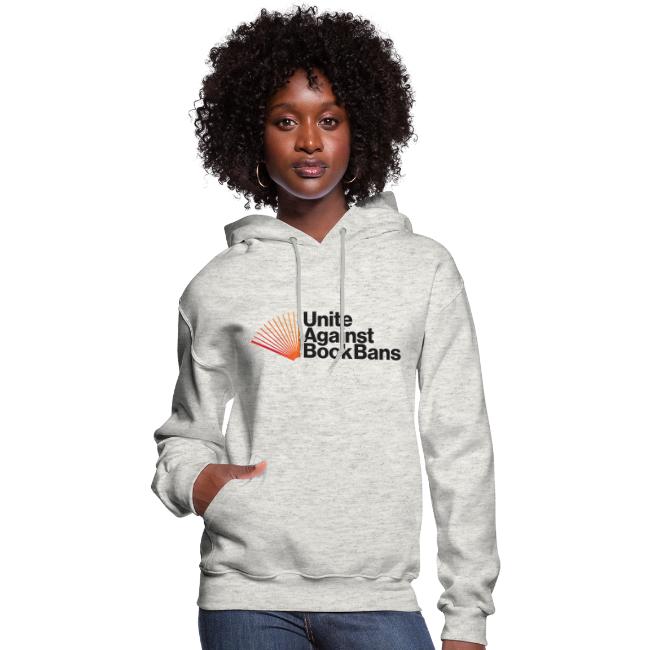
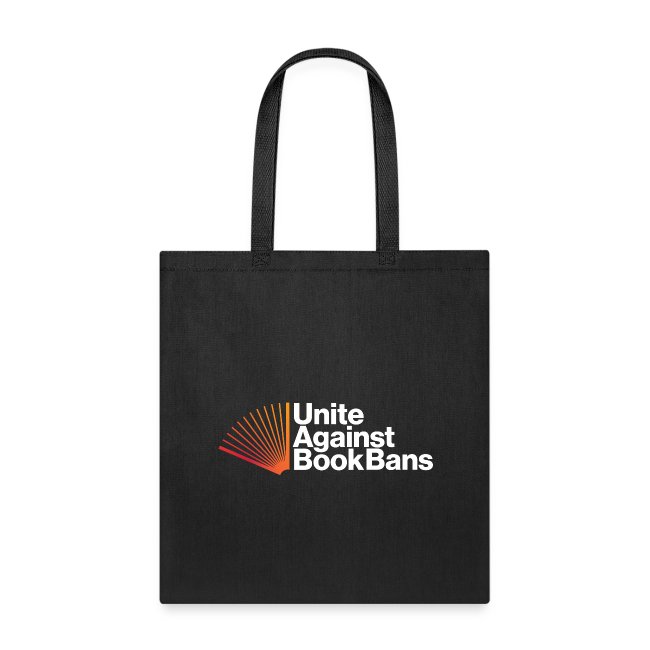

Social Media Tools
Spread the word to your friends and followers with our shareable graphics and posts. Download sets include graphics sized for Facebook/Twitter, Instagram, and Instagram Stories.
Don't forget the hashtag! #UniteAgainstBookBans
Shareable Graphics
Sample post
Join us: UniteAgainstBookBans.org. Follow: @UniteAgainstBookBans. #UniteAgainstBookBans
Download this social set.
Sample post
Sign up at UniteAgainstBookBans.org. #UniteAgainstBookBans @UniteAgainstBookBans
Download this social set.
Sample post
Sign up at UniteAgainstBookBans.org. #UniteAgainstBookBans @UniteAgainstBookBans
Download this social set.
Sample post
Sign up at UniteAgainstBookBans.org. #UniteAgainstBookBans @UniteAgainstBookBans
Download this social set.
Sample post
Librarians respect each person's right to read what they want, but not to dictate what other people's children read. Join us: UniteAgainstBookBans.org @UniteAgainstBookBans #UniteAgainstBookBans
Download this social set.
Sample post
Librarians respect each person's right to read what they want, but not to dictate what other people's children read. Join us: UniteAgainstBookBans.org @UniteAgainstBookBans #UniteAgainstBookBans
Download this social set.